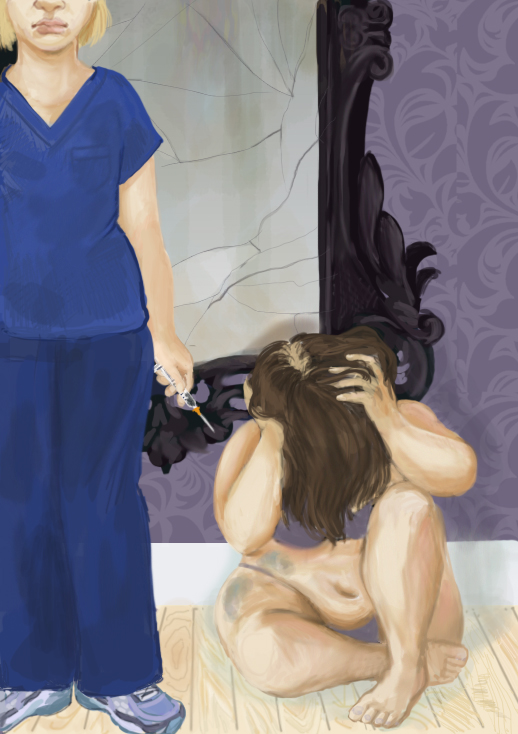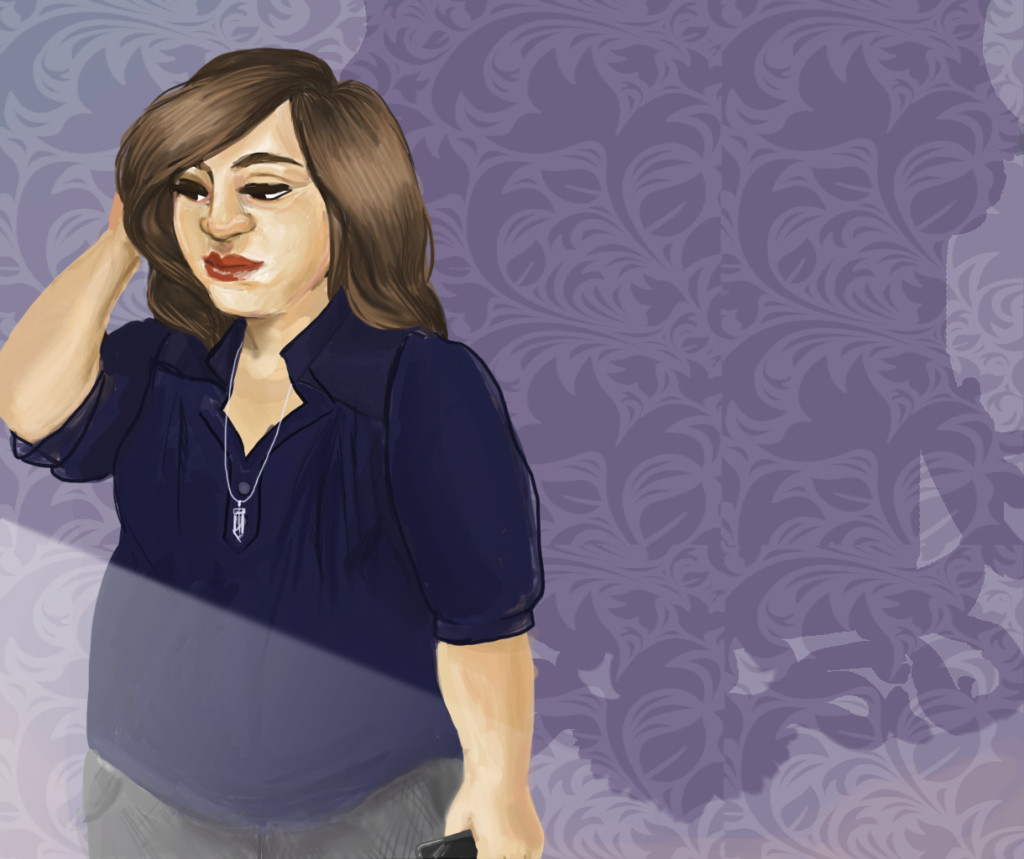Trigger warning for disordered eating, fatphobia, body shaming, weight loss and discussion of diets. If you are struggling with an eating disorder, the National Eating Disorder Information Centre has a toll-free helpline that you can access by calling 1-(866)-633-4220.
“The more beautiful we are, the more admired our appearance, the closer we approach the dream of the incredible beauty, the less reality our personality or intellect will have. […] This only goes for women, of course; men’s character and personality and will always shine through their appearance, both men and women look at them that way. But one is taught in society by the emphasis on the images of feminine beauty to view women differently. The important thing is not the mind, the will, but the appearance. You ARE your appearance.”
Dana Densmore, “On the Temptation to be a Beautiful Object”
A week or two ago I missed a call from an unknown number. Instead of phoning back immediately, I took a second to google who it was that had called me without leaving a message. I quickly realized that, rather than an employer or friend, the call was from a diet clinic that I had frequented a few years ago. When I was 18-19 years old, I had used this clinic to lose 66 pounds in five months. They were calling, as they do from time-to-time, to ask if I wanted to come back for a “tune up.”
I was initially encouraged to go to the clinic, as with all my previous dieting efforts, by my parents. Their motto throughout my childhood was always: “You’ll find a boyfriend once you lose some weight.” They whispered this to me over dinner tables to encourage me to eat dry spinach salads and skinless chicken breasts. They used this slogan as bargaining clout when they would offer me vacation souvenir money in return for pounds I lost. “We’re worried about you,” they said, when they encouraged me to go to the clinic for the introductory session. “You gained weight while you were travelling on your gap year and you just don’t seem happy at this size.” Their reasoning was always the same: my weight was the root of all my “problems”, in particular my solitude.
Growing up, I escaped my self-hatred by getting lost in the same (heterosexual) teen romance movies over and over again. My favourites were the ones in which unconventionally attractive girls underwent make-overs and then fell in love – Never Been Kissed and She’s All That topped the list. By watching those types of movies, reading teen lit, through conversations on the playground, and via every other facet of my day-to-day childhood life, I came to learn that my parents weren’t the only ones who thought that thinness was a prerequisite for love.
And love, as I also learned throughout my entire childhood, was the most important thing of all. Feminist scholar Adrienne Rich writes that the “ideology of heterosexual romance is beamed at [girls] from childhood out of fairy tales, television, films, advertising, popular songs, wedding pagentry,” and “has been represented as the great female adventure, duty, and fulfillment.” You’re taught, to put it bluntly, that if you never find love, nothing else you accomplish will ever matter. As a woman, you’re taught that finding a man who loves you is necessary for your “psychological completion.” Meanwhile, in every one of these love stories, regardless of medium, the female protagonist looks the same: she has long, shiny hair, white skin, and a thin body. While male protagonists come in all shapes and sizes, female protagonists share the same figure, and fat women are relegated to the role of sidekick or comedic relief. The narrative in our society, usually hammered home in much subtler ways than my parents’ slogan, is that you need to be thin to be loved, and you need to be loved to live any type of life worth having (further reading).
So with the knowledge that my life would be void of love – and therefore meaning – if I didn’t lose weight, I heeded my parents’ advice and went to the clinic for the first time. I would walk through those doors three times a week for the five months that followed. While I was on the clinic’s diet, I was only allowed to eat around 350 calories a day (sometimes more like 200), with portions selected from a short list of allowed foods. The foods were so selected to minimize caloric, sodium, and sugar intake. Absolutely everything was fat free. An example of a day’s spread would be a: small apple, four crackers, two small pieces of chicken, and a green salad with low calorie dressing. Every time I went to the clinic, they tested my urine to see if I had cheated on the diet. Though I never cheated, they would still often take away my bread and fruit portions if they determined that my body wasn’t sufficiently burning fat (which became more frequent as my body adjusted to the diet). During every clinic visit they would also review my food log and weigh me before giving me a double injection of vitamins into my thigh or stomach. The injections were painful and left me with massive bruises because the nurses often didn’t administer them properly. Luckily I could hide the bruises, but other symptoms of the diet weren’t as easily forgotten, like the rapid hair loss and my increasingly erratic behaviour.
Over the course of the diet I developed a compulsive need to weigh myself at least eight times a day, and would often try to make myself vomit, though I never succeeded. I also did not get my period for three months. Though in pictures from the period I look gaunt and frail, I wrote about how overweight I felt and how I didn’t want to be seen in public. Having started the diet at 198 pounds, I quit while weighing in at 132. My weight loss had stagnated and I remember thinking to myself, ‘It’s fine because even though I’m still fat, I’m attractive to men now as long as I hide it with clothing, and I’ll just lose the rest on my own through exercise.’ Even at that time, when I was wearing size 3 jeans and while I was the thinnest I will probably ever be in my life, I still held the male gaze as the number one marker for my value. Even though I was aware that my body was rejecting the diet (and quite frankly, the loss of my period scared the shit out of me), I still thought that becoming conventionally attractive was more important than tending to my health.
Four years later, as my friend circles and politics have changed, this is a part of my history that only a handful of people know about. As you would expect with any crash diet, I gained most of the weight back within a year. I hid my ‘thin clothes’ in the back of closets for future days, and did my best to avoid looking at the thin photos of myself (which still sometimes fill me with feelings of shame at my re-gain). I learned to ignore my parents when they (to this day) blame my weight for my singledom or make disparaging comments about my body size and eating habits. Gradually, through feminism, I came to understand my dieting experiences and parents’ words as the result of a patriarchal Western society that enforces narrow standards of beauty. I realized that I was the collateral damage of a society which teaches women to see their pant sizes and marriages as the most salient components of their identities. I also, with a little time and a lot of patience, came to understand the importance of unlearning.
In a broad sense, unlearning means fighting against the social constructs that you have internalized and critically reflecting on what you’ve come to believe about the world’s structures and mechanisms. Unlearning is a process important to every type of oppression, a process that is central for any and every person who is learning how to newly navigate this world through social justice frameworks. In this case, unlearning means first rejecting the idea that heterosexual romance is the purpose of my life (or that any romance is the purpose of anyone’s lives). Unlearning means unpacking what it means to be “attractive” or “beautiful” in a society that conflates these words with “thin.” Unlearning means reflecting on how those concepts intersect with our society’s ideas about love. Unlearning means shushing the little voice in my head that still whispers “it is because of your weight” every time things don’t work out with someone I have feelings for. Unlearning means accepting that I am fat, that I am single, and that both of these things are totally okay. And most of all, unlearning, for me, means deciding not to call the clinic back this time.






